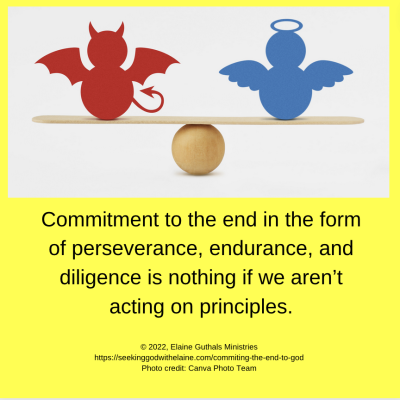We must be committed to doing what God asks until we have competed the tasks and completed our sanctification. This devotional looks at how we persevere and not grow weary.
Nuggets
- We must be committed to the end to persevere, endure, and be diligent.
- Losing our commitment to our purpose — growing weary in doing good — allows Satan to tempt us into disobedience.
To read devotions in the Habitual Holiness of Heart and Life theme, click the button below.

When we choose to accept God’s Plan of Salvation, it isn’t a one-and-done deal. Oh, yes. We choose salvation, and we are saved.
Salvation is just the beginning. That choice, however, sets us on the path to navigate the Sanctification Road. This is the process through which we become mature disciples.
That process is not an easy one. It is hard for us when we are tempted by Satan to deny God.
Because of that, we have to commit to God to follow His Will.
Let's Put It into Context
Here is a running list of nuggets for the series.
Here is a running list of nuggets for the study.
The foundation of the devotions in this series are Stratham’s Commit Thy Way and Littleton’s Confidence in God.
Persevering/Enduring
“And let us not grow weary of doing good, for in due season we will reap, if we do not give up” (Gal. 6: 9 ESV)
We must be committed to the end to persevere, endure, and be diligent.
Perseverance, endurance, diligence. We’ve talked about these topics several times.
To read a related devotion, click the button below.
Diligence is a consistent, persistent effort through repentance to obey God’s laws and commandments.
All of those must contain an element of commitment to ensure successful attainment. If we aren’t committed to the end, perseverance, endurance, and diligence gain us nothing.
Weight took that a step further. He wrote, “… the conscientious, right-minded, true servant of God is a man of determination; he acts from principle, not impulse; his heart is in the work, therefore he proceeds in it, doing his utmost to discharge the duties God has laid on him.”
Resource
Commitment to the end in the form of perseverance, endurance, and diligence is nothing if we aren’t acting on principles. We can’t be going off half cocked. Our actions have to be based on what we believe.

But hang on. That doesn’t go far enough, either.
Our beliefs have to be focused on God. We have to be doing our utmost in performing all He requires of us. That takes it beyond performing worldly duties for worldly accolades.
We have to be submitting to God to do all He has called us to do for His glory and honor alone.

This is important to us. Merry said that, by committing to endure to the end, we are in the process building our character for eternity.
Resource
Something just flitted through my mind. Let’s see if we can flesh it out.
- “And let us not grow weary of doing good, for in due season we will reap, if we do not give up” (Gal. 6: 9 ESV).
- “And we know that for those who love God all things work together for good, for those who are called according to his purpose” (Rom. 8: 28 ESV).
Are the two goods the same? I think so.
We are not to grow tired of doing God’s Will. His Will is that we follow His laws and commandments, so that we gain His character.
God will work everything out so that, when we have submitted ourselves to Him, we gain His character. We complete His work and grow closer to Him.
So, to me, it is all the same. God’s first and foremost priority is our salvation and using us to preach to and make disciples of others. That is in our job description.
The Disciple’s Job Description
Complete Job Description
Individual Description
Job Duty #2
Work Out Our Salvation (Philippians 2: 12)
Job Duty #4
Proclaim the Gospel (Mark 16: 15)
Job Duty #6
Make Disciples (Matthew 28: 19-20)
Horwood made a good point. What we are doing well must be inward and outward. It has to start with our faith and come out in our actions.
Resource
Not only that, but our well-doing must also embrace our virtues. They must stem from a grateful heart.
Not Growing Weary
“And let us not grow weary of doing good, for in due season we will reap, if we do not give up” (Gal. 6: 9 ESV)
Losing our commitment to our purpose — growing weary in doing good — allows Satan to tempt us into disobedience.
Horwood had a kind of scary take on growing weary. He wrote, “The apostle means by this charge that we are not to allow any kind of weariness in right doing to arrest us in the discharge of duty, or to force us away from its path.”
Resource
I don’t know about you, but to me, that seems humanly impossible. Any kind of weariness takes in a broad array of deterrents.
So, we just throw in the towel from the get-go? No! That is detrimental to our sanctification!!
Let’s start out by trying to see what Paul meant by weariness. We know what it means to be weary in mind and body.
Right now, I am really tired. I just woke up from a nap that needed to be longer than it was. I am weary in body.
It was really hard to start writing, but I know one of my tasks for Him is to write these posts.
But that is physical. Yes, God doesn’t want me to get physically burned out because I are trying to be Super Chick and do everything — especially my own way. He wants me to follow His lead on what I am and am not supposed to do and how.
Horwood acknowledged that our physical weariness is based on our human nature. It is part of the life we have, if not before the original sin, definitely after as a result of sin.
Scott really didn’t have much good to say about our physical qualities. He said we were impulsive and generally failures.
Resource
The weight of the flesh makes us weary. We were created to be something different than we are now. That creates a conflict within us that weighs on us.
But Scott did make a good point. God’s ways are not our ways, so we probably are going to misunderstand them. That uncertainty will cause weariness.
We know God’s way is He is less concerned about the physical and more concerned about the spiritual. Our spiritual part is based on our faith. Faith is a gift from God and a work of the Spirit that enhances the conviction that the doctrines revealed in God’s Word are true, even if we do not understand all aspects of them, a belief which impacts our lives and distinguishes us from others.
Glossary
That puts a whole different slant on things. We have to be persevering and enduring because, since we are doing God’s Will, Satan will be bombarding us with temptations and trials. We can’t grow weary in our fight against Him.
We have to be patiently enduring. That is where the diligence comes in to play.
Things aren’t always just going to fall into place because it is God’s Will. Oh, we’ll see and feel the clicks when they do.
But there could be some testing there, too. God could be checking on our commitment. If we are only committed during the good times when we get the great rewards, we really aren’t committed to Him. (We are committed to what we get out of the process.)
Since this commitment is based on faith, it is also based on hope. Hope is the expectation, also called a living hope, based on the confidence that, because of our relationship with God, our names will be found in the book of life.
Hope is really important because when we are doing God’s work, it probably isn’t going to be a success story right out of the gate. It is going to take a while. That is why Paul said “… for in due season we will reap, if we do not give up” (Gal. 6: 9 ESV).
God’s timing is not our timing. We aren’t going to be following our timetable.
That makes it imperative that we don’t get weary and give up. Nothing is more frustrating than thinking we are doing what is right — what we are called to do — and not getting any results. Can we spell F-A-I-L-U-R-E?
Nope. If we are doing God’s Will as He asks us to do, we are not failing. We may not be succeeding by a worldview definition, but we are succeeding at doing His Will.
Doing Good
The good is doing God’s Will.
Brown said that good includes truth, honor, and godliness. It isn’t random acts of kindness toward others.
Resource
It is essential that we include doing good according to truth, honor, and godliness. Salvation isn’t complete without them. We can’t just keep the laws and commandments and think that will save us.
So, it is about attitude. Even though we might want to grow weary doing God’s Will, we don’t because we love God and want to be obedient to Him. We have to be content even when we have the pull to discontentment.
Flower is right when he says that makes religion practical. We have duties — to God, ourselves, and others. Yes, they are multiple duties toward multiple relationships.
Rodgers expanded that by saying the duties are called well-doing (in the King James Version) because, when we do them well, we gain God’s approval. They are called good because we are doing good rather than evil, striving toward purity rather than defilement of sin.
Resource
What I found interesting is that Flower equated spiritual exhaustion with worry. Worry helps us spin our wheels when doing God’s work, causing even more exhaustion.
The worry takes the focus off God and makes us doubt Him. We really aren’t going to succeed then!
Resource
We want to be committed to the end, so we don’t grow weary and give up on God or godliness. We have to be faithfully, diligently navigating the Sanctification Road at the end. “But the one who endures to the end will be saved” (Mt. 24: 13 ESV).

Making the Connections #1
In the last devotion, we talked about how we should be committed to meditation and prayer. I haven’t changed my mind there.
That isn’t all we are called to do. We have marching orders. We are to preach and make disciples.
Merry said we shouldn’t build religious castles. We have to be a blessing to others.
Resource
Making the Connections #2
Weight reminded us of one of the biggest impediments to our commitment — our feeling of inadequacy. We don’t feel we are worthy or skilled enough to complete the tasks to which God calls us. We see the reasons why we think God wouldn’t want to use us.
Resource
Think Moses. Isaiah. Jeremiah. Elaine.
Of course, Satan is going to be working overtime trying to convince us those things should stop us from being used by God. And most times, those are exactly the reasons why He does.
No, we aren’t worthy — until Jesus makes us worthy. No, we aren’t skilled enough or smart enough or any enough until God equips us.
“Now may the God of peace who brought again from the dead our Lord Jesus, the great shepherd of the sheep, by the blood of the eternal covenant, equip you with everything good that you may do his will, working in us that which is pleasing in his sight, through Jesus Christ, to whom be glory forever and ever. Amen” (Heb. 13: 20-21 ESV).
It isn’t about us. It is about the God who calls, equips, and sustains us.
How Do We Apply This?
- Complete the works God has for us so that we can gain the reward for them.
- Watch our attitude, especially when we think we are failing because we are not getting the results we expected.
- Change our definition of success to one of obedience rather than results.
- Persevere until we receive the reward.
- Be sure of our obligation to conduct ourselves under God’s laws and commandments.
- Ensure we don’t grow weary by loving God and others.
- Be steadfast because we abhor sin.
- Understand that holiness is a qualification of being a child of God.
- Understand our labor will not be in vain if we persevere in God’s Will.
- Seize all the opportunities given to us to do well.
- Rely on God’s promises that our diligence will be rewarded.
- Don’t expect random acts of kindness to substitute for diligent good works.
- Don’t think this is just a personal self-help exercise — we must be training others to do good for God.
- Form new habits to do good and resist fleshly passions and sin.
- Pray for grace, faith, hope, and love.
- Follow God’s direction and don’5tt try to do everything at once.
- Expect results on God’s timetable.
- Don’t give up too soon.
- Don’t become complacent in prosperity.
- Grow our faith by staying close to God.
- Pray unceasingly.
- Help others.
- Plan, but carry out our plans to improve our relationships with God and to make disciples of others.
- Don’t worry about our legacy but glorify God.
Resource
Father God. We commit to endure in all things to complete the plans You have for us. Help us to not grow weary in doing Your work. Amen.
What do you think?
Leave me a comment below (about this or anything else) or head over to my Facebook group for some interactive discussion.
If you don’t understand something and would like further clarification, please contact me.
If you have not signed up for the email daily or weekly providing the link to the devotions and the newsletter, do so below.
If God has used this devotion to speak with you, consider sharing it on social media.